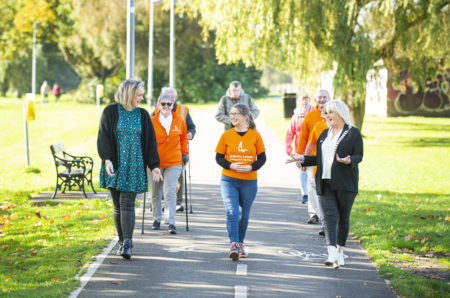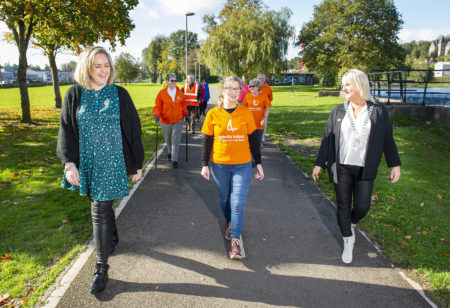15 October 2020
By Elaine Murphy
elaine@TheCork.ie
- New Survey highlights impact of Covid-19 on people with arthritis
- 44% of people with inflammatory arthritis had hospital appointment cancelled or postponed
More than four in ten (44%) people with inflammatory arthritis had a hospital appointment to see their consultant cancelled or postponed during Covid-19.
The finding is contained in a survey published by Arthritis Ireland to mark World Arthritis Day, 12 October, which highlights the impact of the pandemic on people living with arthritis.

The Mayor of County Cork, Cllr Mary Linehan Foley meets with Eva Kelly, Ciara Curtin Arthritis Ireland and volunteers from Arthritis Ireland to mark World Arthritis Day.
Pictures Gerard McCarthy Photography
One-third (32%) of respondents had scans, blood tests or other tests cancelled or postponed, while 23% had an appointment with a physiotherapist or occupational therapist cancelled or postponed
The research was undertaken during the summer at the end of the initial lockdown and was completed by 1,133 people.
Many people with arthritis are in vulnerable groups when it comes to the coronavirus, either due to having an autoimmune condition or being over 70. Three-quarters (73%) of those surveyed cocooned at some stage during the pandemic.
The research findings highlight the impact of Covid-19 on the mental health of people living with arthritis. Sixty-eight per cent of respondents reported that they felt more nervous, anxious or on edge since the start of the pandemic than they would ordinarily. Seven in ten (72%) of respondents who were on immunosuppressants said that they often or sometimes felt more at risk of catching Covid-19, while 73% often or sometimes worried about being very ill if they got Covid-19.
The survey also looked at people’s levels of physical activity during the pandemic. While 39% of respondents said they were physically active on at least 5 days per week during the lockdown, 45% spent less time doing physical activity during the lockdown than before it. Less than one-quarter (23%) participated in online exercise classes – such as pilates, yoga, tai chi, Joe Wicks, seated exercises or spinning – during the lockdown.
According to Arthritis Ireland chief executive, Gráinne O’Leary, “People with arthritis have been significantly affected by Covid-19, in terms of their physical health and their mental well-being. It is particularly concerning that so many people have had their access to necessary health services adversely affected by the pandemic.
“We need urgent action to ensure that people with arthritis can access these services and healthcare professionals in a timely fashion. Arthritis is a chronic, destructive disease – it doesn’t stop while we’re trying to solve the pandemic,” she stated.
Mayor of the County of Cork. Cllr Mary Linehan Foley, met with volunteers from the Cork branch of Arthritis Ireland to mark the international awareness day.
Cllr Linehan Foley said: “Arthritis affects almost 140,000 people in Cork. It is important that we recognise the impact this invisible, chronic condition has on people’s lives both young and old. On World Arthritis Day I am delighted to show my support for Arthritis Ireland and the invaluable work that they do. It is important to highlight the help, support and information that is available through Arthritis Ireland for people with this challenging condition. On this international awareness day please show your support.”
Prof. Geraldine McCarthy, president of the Irish Society for Rheumatology and consultant rheumatologist at the Mater Hospital said: “Covid-19 has had a significant negative impact on rheumatology services in our hospitals; in particular, on our capacity to see new and as well as existing patients.
“We urgently need to implement patient-centred, cost-effective and achievable solutions to address this situation. We need more rheumatologists and to appropriately deploy the expert staff we already have, like advanced nurse practitioners. Triage clinics led by specialist physiotherapists can make a major difference in the community.
“There are also immediately achievable solutions, like virtual clinics for suitable patients and investing in physical infrastructure dedicated to seeing rheumatology patients.
“If we don’t take these positive decisions now, we are storing up future problems and costs – for people with arthritis, certainly, but also for society and our economy. The government and the HSE need to act now,” Prof. McCarthy stated.
Suzanne Coombs (27) from Galway has been living with ankylosing spondylitis since she was 15. She’s had routine hospital appointments cancelled and postponed until next year, as well as injections into her discs postponed.
“My mental health has suffered considerably,” she said, “because the support structures I had been relying on aren’t available, and there is a lot of uncertainty regarding when they may be opening again.
The findings of the Covid-19 and arthritis report are published on the Arthritis Ireland website, www.arthritisireland.ie.


